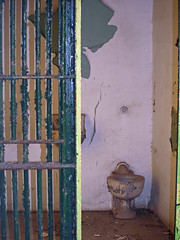 Unfortunately I find it all too easy to believe. As long time readers are aware, I’m the member of the team who is not in San Diego. I’m located in my home town of New Orleans, a city as rich in culture as it is in tragedy.
Unfortunately I find it all too easy to believe. As long time readers are aware, I’m the member of the team who is not in San Diego. I’m located in my home town of New Orleans, a city as rich in culture as it is in tragedy.
Cindy Chang of the New Orleans Times-Picayune showed us just how bad things have become in her cover story yesterday.
Louisiana is the world’s prison capital. The state imprisons more of its people, per head, than any of its U.S. counterparts. First among Americans means first in the world. Louisiana’s incarceration rate is nearly triple Iran’s, seven times China’s and 10 times Germany’s.
The hidden engine behind the state’s well-oiled prison machine is cold, hard cash. A majority of Louisiana inmates are housed in for-profit facilities, which must be supplied with a constant influx of human beings or a $182 million industry will go bankrupt.
I’ve often written about creeping privatization in our justice system, and with good reason. How can actual justice be involved when the bottom line is to fill as many beds as possible? It’s basic common sense that the two are incompatible, and the latter is ethically questionable.
Even worse is the fact that this approach is funneling money away from programs that do work. Chang continues:
More money spent on locking up an ever-growing number of prisoners means less money for the very institutions that could help young people stay out of trouble, giving rise to a vicious cycle. Louisiana spends about $663 million a year to feed, house, secure and provide medical care to 40,000 inmates. Nearly a third of that money — $182 million — goes to for-profit prisons, whether run by sheriffs or private companies.
‘Clearly, the more that Louisiana invests in large-scale incarceration, the less money is available for everything from preschools to community policing that could help to reduce the prison population,’ said Marc Mauer, executive director of The Sentencing Project, a national criminal justice reform group. ‘You almost institutionalize the high rate of incarceration, and it’s even harder to get out of that situation.’
It pains me to see my hope at the forefront of such a misguided and disastrous trend, especially in these recent years after Hurricane Katrina and the levee failure. We now lock up more human beings than any place else in the world, and yet we still have one of the highest rates of violent and property crime in the entire United States. It’s just not working.
If you want a look at what the rest of the nation will look like if we do not reverse this trend of privatization, read Ms. Chang’s article. It is an extensive and disturbing piece of reporting that will send chills down your spine. I’d also recommend Charles Mondonado’s article in Gambit Weekly – Privatizing Louisiana’s Prisons.
There is a truly frightening future being forged, and I am sitting on it’s leading edge. Please take a look at what is happening down here. Educate yourself before this model becomes the norm.
It is far more expensive to do nothing.









